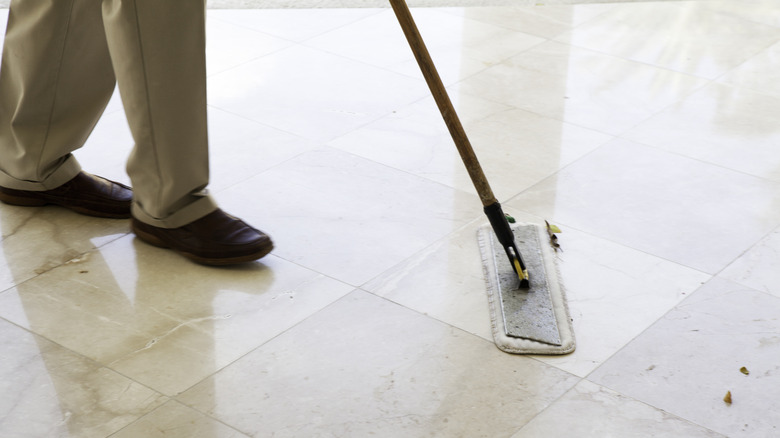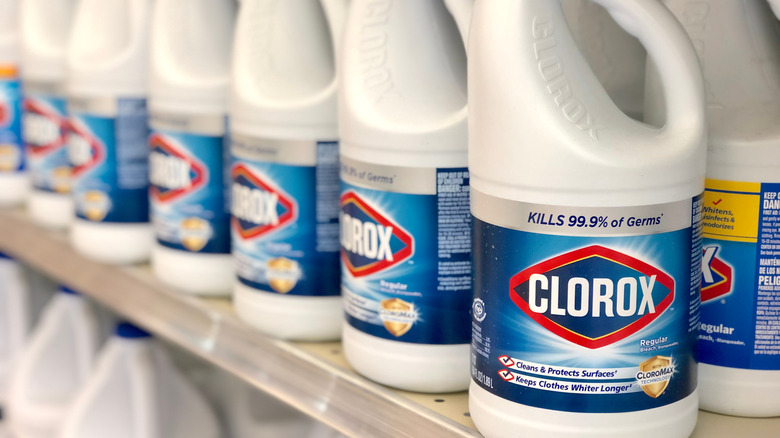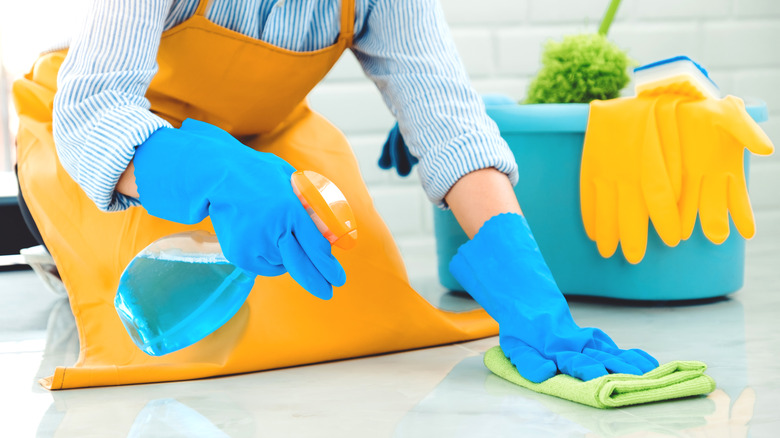The Common Cleaning Agent You Should Never Use On Marble Floors
Bleach is a staple cleaning product in most households and is known to eliminate even the toughest stains that accumulate inside bathrooms and kitchens. But while it might seem like a universal cure when it comes to cleaning, there are some instances where bleach should be avoided in order to protect softer and more sensitive materials around the home from irreparable ruin. Avoid using bleach to clean your natural marble floors or countertops, as the chemical properties that make the product so powerful can cause permanent damage and discoloration.
Marble floors are a striking and oftentimes expensive addition to a home, with contractors charging up to $40 per square foot to install them, which adds up to thousands of dollars worth of labor to renovate any given room inside a house. So, whether you're investing in costly renovations for the home you're already living in or purchasing and designing a new home from scratch, it's important to take great caution when cleaning and caring for marble floors to ensure they remain in stellar condition for as long as possible. Here's more on the dangers of using bleach on marble floors, as well as some safer products you can use in place of bleach to keep them clean.
Why bleach is harmful to marble
After spending a pretty penny to install marble floors inside their homes, homeowners should be especially picky with the products they choose to expose to their new flooring, since these decisions will directly impact the condition of the marble over time. On top of being particularly pricey, marble floors are sensitive to harsh cleaners and food and beverage spills, and you'll start to see long-lasting staining or corrosion if they're not cleaned using proper techniques and substances.
Marble's primary component, calcium carbonate, usually doesn't react well to cleaning products containing high traces of alkalis or acids. Bleach primarily consists of sodium hypochlorite, a highly-reactive chemical compound capable of tarnishing various household metals and natural stones and causing extreme illness among its users if not diluted with water beforehand. When the marble comes in contact with bleach, the combination of chemicals may cause the stone's surface to burn or lose its luster. Although marble floors are cut and molded into maneuverable tiles before installation, the acids may eat away at the stone's protective sealant before eventually harming the stone itself. Even if the sealant alone is destroyed, this makes the marble susceptible to further damage caused by everyday use, like walking or moving furniture.
As a classic whitener, bleach is also known to cause discoloration if used regularly on marble floors. Expect light spots to appear across the stone's surface after using the solution, a result of the product permanently etching the flooring.
Marble-safe cleaning alternatives
Although household bleach is off-limits when it comes to cleaning marble floors, there are safer alternatives you can opt for instead to disinfect your floors, many of which are probably ready to use somewhere around your home. To keep the chore simple, a mild soap mixed with warm water makes for an effective cleaning solution for marble, whether you're spot-treating specific stains or swabbing the entire floor. Castile soap works well, along with certain formulas of dish soap, both of which are gentle enough to do the job without causing unwanted harm. Baking soda is also rough on complicated stains without damaging the delicate marble underneath. But if you're looking to spend some extra money to achieve a higher-quality clean, there are a variety of professional-grade cleaning products designed specifically to sanitize and polish your household marble, typically available online or at a nearby hardware or grocery store. Generally, search for pH-balanced cleaners featuring natural ingredients as opposed to harsh, synthetic chemicals.
While the products listed above are suitable for more thorough cleans, light, day-to-day dustings can be accomplished with a dry dust mop or a soft broom. You should also use soft cloths, sponges, or microfiber towels on marble flooring when wiping up messes or conducting everyday cleanings. Hard, bristly handheld brushes or brooms can scrape the natural stone and leave it vulnerable and exposed. The metamorphic rock is also porous, so go over floors with a dry applicator after treating it with water or other liquid solutions.


